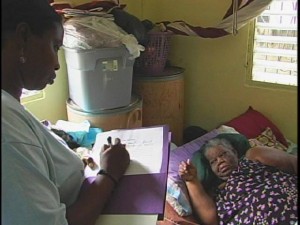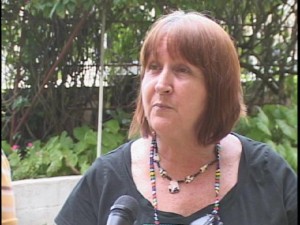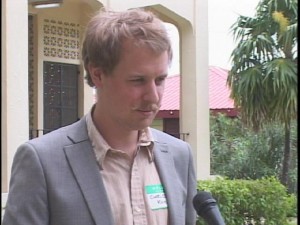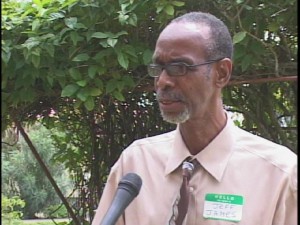The elderly need financial assistance as well as TLC
 The recent National Country Poverty Assessment Report shows that well over forty percent of the population lives below the poverty line. It also shows that poverty among the older populace is high and most senior citizens do not claim any form of benefits. Those few senior citizens who do get benefits, receive a mere hundred dollars per month, which is way below international standards. But are these international standards affordable and should those funds be extended to all senior citizens? That is an issue that the National Council on Aging is discussing. News Five’s Delahnie Bain has a report.
The recent National Country Poverty Assessment Report shows that well over forty percent of the population lives below the poverty line. It also shows that poverty among the older populace is high and most senior citizens do not claim any form of benefits. Those few senior citizens who do get benefits, receive a mere hundred dollars per month, which is way below international standards. But are these international standards affordable and should those funds be extended to all senior citizens? That is an issue that the National Council on Aging is discussing. News Five’s Delahnie Bain has a report.
Delahnie Bain, Reporting
The elderly population is rapidly growing throughout the region; unfortunately the poverty level among the senior citizens is equally on the rise. A meeting hosted by the National Council on Ageing this morning, is expected to be the first step to making a positive change for the elderly.
Lindy Jeffrey, Executive Director, National Council on Aging
“The purpose of today’s meeting really is to look at what has been happening with older people over the last few years; looking at their poverty issues because the National Country Poverty Assessment has been released, which shows that poverty amongst older people is very high. The National Council on Aging has conducted a situational analysis, which also indicated the degree of poverty and the fact that majority of older people do not claim any form of benefit or pension.”
And being the main source of income to most senior residents, the pension scheme was the focus of the discussions. Consultants from HelpAge International are in the country to look at the possibility of implementing a universal social pension.
Charles Knox, Policy Officer, HelpAge International, London
“Helpage International, in partnership with some of the organizations here are going to be undertaking a feasibility study on the feasibility of a universal pension in Belize, which would essentially involve the extension of the current non-contributory pension to everyone over a certain age; say sixty-five.”
Lindy Jeffrey
“If they’re not getting adequate income then they do not enjoy a good standard of health, they’re not able to afford their medication when they need it, they’re not able to afford to even repair their homes when they’re in bad condition.”
But according to the HelpAge International representatives, there a several determining factors.
Jeff James, Regional Rep., HelpAge International, Jamaica
“The state of the economy and what the economy can afford in terms of a universal social pension. You also tend to look at the number of people who are currently without a social pension or non-contributory pension and we also look at what is affordable.”
Charles Knox
“I think there does seem to be a strong feeling that the current amount given out in the pension doesn’t seem to be quite enough. When you look at the amount, which is a hundred Belize dollars a month, if you look at that by international standards, it is pretty low. I think there’d certainly be an argument for increasing that somewhat. One issue, which isn’t just specific to Belize, is that any targeted, any means tested program will end up missing out a lot of the poorest people. The poorest people find it hard to access administrative assistance.”
Jeff James
“In the case of a universal non-contributory pension, everybody gets it regardless of income or whatever resources or assets that they have. What the universal approach does, is that it does not exclude anybody.”
With the current state of the economy, financing is clearly the biggest concern. Regional Representative for the Caribbean, Jeff James, says it simply requires the proper use of resources.
Jeff James
“If we look at some of the preliminary calculations that we’re doing, I don’t think that it is going to cost more than three to four times of current expenditure that is spent on non-contributory pensions and it is not going to be more than two or three percent of the overall government expenditure. So you’re not talking about a lot of money here. So I think it is something that could be done, what is needed is the political will. What is also needed is a people to lobby—civil society that is—to lobby government and make sure that it is put in place.”
According to the council’s Executive Director, Lindy Jeffrey, the government is working on poverty alleviation measures but they are not sure how much of an effect those plans will have on the elderly population. Delahnie Bain for News Five.
The National Council on Aging emphasizes that the social protection of elderly citizens should be taken seriously by both the young and old populations.




Big up to Ms. Lindy who has been working ardously for the well-being of our golden citizens who normally are left one side or seen as extra baggage.
Ms. Lindy can be seen many times after hours working hard like a young girl. I really like when she said that many older citizens are doing work that we the younger ones don’t want to do on “Open Your Eyes” show. It is a fact that older citizens have contributed greatly to what we can now enjoy in Belize and its only fair that they get recognized and taken care of in their old age.
Proper use of resources???????????? …………….. PUT THE PRISONERS AT the KOLBE RESORT TO WORK…….. they can produce enough food so that at least the government can be able to provide food for those in dire need….. AS Mr. James SAID…..THE POOREST PEOPLE.
huh and the PM done di talk bout cut down on pertioners wa the hell huh !!!!
Earl Grey………. I second that motion whole heartedly. Government needs to identify good arable land, choose low risk minimum security prisoners and grow thing fi eat. There is absolutely no reason why our senior citizens should be punishing for lack of at least food, when we have all this land, an over populated prison that tax payers are maintaining, with food and shelter everyday. Sometimes I just wonder if these Politicians think of anything other than enriching themselves………..